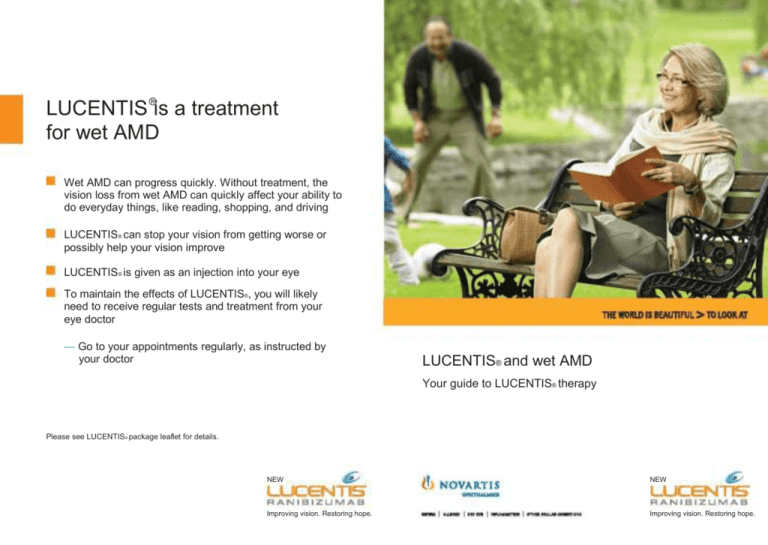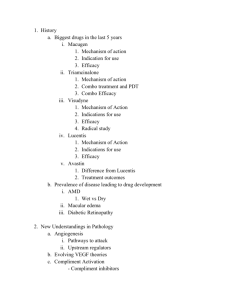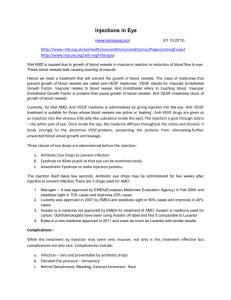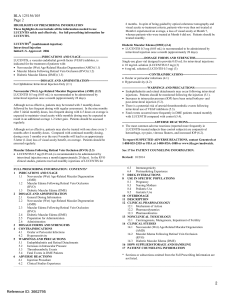LUCENTIS is a treatment for wet AMD Wet AMD can progress
advertisement

LUCENTIS ®is a treatment for wet AMD Wet AMD can progress quickly. Without treatment, the vision loss from wet AMD can quickly affect your ability to do everyday things, like reading, shopping, and driving LUCENTIS® can stop your vision from getting worse or possibly help your vision improve LUCENTIS® is given as an injection into your eye To maintain the effects of LUCENTIS®, you will likely need to receive regular tests and treatment from your eye doctor — Go to your appointments regularly, as instructed by your doctor LUCENTIS® and wet AMD Your guide to LUCENTIS® therapy Please see LUCENTIS® package leaflet for details. NEW NEW Improving vision. Restoring hope. Improving vision. Restoring hope. Why did my doctor prescribe LUCENTIS for me? ® Your doctor thinks you should receive LUCENTIS® because you have a disease called neovascular (wet) age-related macular degeneration (AMD), which is making it harder for you to see LUCENTIS® can stop your vision from getting worse or possibly help your vision improve NEW 2 Improving vision. Restoring hope. What is wet AMD? Wet AMD damages your eyesight by causing new, weak blood vessels to grow and leak into the back of your eye, making it harder for you to see Wet AMD affects the area of your eye that lets you see details in the centre of your vision LUCENTIS® prevents the new, weak blood vessels from growing and leaking, and may even repair some of the damage that has been done Wet AMD can progress quickly. Without treatment, the vision loss from wet AMD can quickly affect your ability to do everyday things, like reading, shopping, and driving You may not have noticed that you have wet AMD until you started to see wavy lines, blind spots, or other changes in your vision Normal vision Vision affected by wet AMD Wet AMD is a long-term disease and most patients will need long-term treatment NEW 4 Improving vision. Restoring hope. What will treatment with ®LUCENTIS be like? LUCENTIS® is given as an injection into your eye Your doctor may ask you to use eye drops for a few days before the injection to help prevent infection At your appointment, a doctor or nurse will get you ready for the injection — Your face and the area around the eye will be covered with a special drape — Your eye and the skin around your eye will be cleaned to avoid infection — The doctor will use a device to hold your eye open — Your eye will be numbed with an anaesthetic so that there is no pain The doctor will then give the injection into the white part of your eye — Some patients say they feel a little pressure on the eye when the injection is being given NEW 6 Improving vision. Restoring hope. What will happen after my ®LUCENTIS injection? The doctor will perform some routine eye tests to make sure your treatment went well — The doctor may ask you to use eye drops for a few days to prevent any infections The white of your eye, where the injection went in, is likely to be red — This redness is normal and should go away in a few days — If it doesn’t go away, or gets worse, contact your doctor You may see a few “floaters” or “spots” in your vision — These spots are normal and should go away in a few days — If they don’t go away, or get worse, contact your doctor Occasionally, injections in the eye can cause infection, so watch for changes in the condition of your eye in the week following your injection — If you have increasing pain or discomfort, swelling, increasing redness, blurred vision, increasing sensitivity to light, or drying of the surface of your eye, contact your doctor as soon as possible NEW 8 Improving vision. Restoring hope. How well does ®LUCENTIS work? Over the course of LUCENTIS® treatment, most patients find their vision stays the same, and for some, it gets better Around one third of patients will have noticeably better vision with LUCENTIS® With treatment, you may find you are once again able to do everyday activities that you have found difficult since you got wet AMD It’s important to talk to your doctor about how the treatment is working for you NEW 10 Improving vision. Restoring hop How long will I need to continue ®LUCENTIS treatment? Go to your appointments regularly, as instructed by your doctor Tell your doctor how you feel about your treatment experience and the results To maintain the effects of LUCENTIS®, you will likely need to receive regular tests and treatment from your eye doctor If your vision doesn’t get better immediately, don’t stop going to your eye doctor appointments—talk to your doctor Not every patient will have noticeably better vision with LUCENTIS®, but remember that without treatment, your eyesight could get worse quickly NEW 12 Improving vision. Restoring hope. Where can I get more information on wet AMD and low-vision services? AFFIX CD HERE Local CPO to list NEW 14 Improving vision. Restoring hope.









